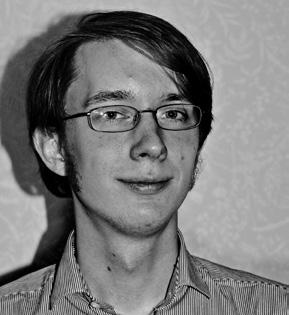
3 minute read
Motion of acceptance
Blonde hair is surrounding the wounded, bleeding face on the sticker. Mass immigration. Not only pizza. I have to read a second time before I get the message. The message proposes the beating is a consequence of "mass immigration", a phrase that is heard with increasing frequency since the Sweden Democrats1, a populist right wing party took place in parliament. I prepare to cross the road, as I'm struck by the thought: Why should I let the message reach anyone at all?
If you tolerate this is one of the songs I like the most by the Manic Street Preachers. It's about the Spanish civil war, and about the victims of fascism, then as well as today, but there is one line that disturbs me. ”If I can shoot rabbits, then I can shoot fascists”. One night I have some friends over for dinner and one of them makes a joke about thieving immigrants. I am reminded that racism is part of our culture, not something that only some scary uneducated fascists are doing.
Advertisement
After work on All Saints' Day I am walking home from the graveyard where I had met with some people paying their traditional visits to their families' and friends graves. I pass by the small river, when I see the stickers again. Mass immigration, a ticking bomb, says one. Mosques in Sweden? No thanks! Proclaims the other. On every trashcan in the area, I can read the racist messages of different far-right networks. As well as I can I tear them all down. Some people pass me as I stand with my clergy shirt. I hope they understand why I scratch so eagerly.
”How much immigration can Sweden take?” This is the theme for a debate on national television. Immigration is a problem, the statement is posed as an axiom, an unquestionable truth with two sides or answers: more or less immigration. How much can we all adjust to racist questions like that? Why isn't another perspective heard, the voice declaring all the things diversity means to us, the priceless value of an open society?
My peers at University have a unanimous contempt for the right wing populists. Their answers to the problems of political life are ridiculed. Who takes these people serious, who votes for them? Another scandal among many surfaces, this will surely mean that they disappear. Three leading radical right wing politicians belonging to the Sweden Democrats have filmed themselves in a quarrel with a migrant comedian, calling him names and denying his right to a Swedish citizenship. A woman interferes and now they turn on her. The film is released now, two years later, and several leading figures are forced to resign.

In the coffee room we are talking about the way people adapt to society's views of them, how the heritage or culture is not a problem as big as the way an immigrant is faced in our society. We discuss the risks of our prejudices. At least, I think that is what we discuss, when the discourse suddenly turns. “But sometimes, they have themselves to blame” a colleague says and portrays some Roma man (that means, not necessarily an immigrant) who “destroys it for all the others” by behaving bad. Failing to communicate the logical gap in her argument, I do my dishes and leave the room.
The next opinion polls arrive. Is it just the winter cold or did the climate in society actually grow colder? I pull my collar up to cover my ears and duck away from the icy winds blowing trough the streets. The Sweden Democrats have gained increased support and now have the support from twelve percent of the people. Are we so disillusioned that we allow violent drunkards in parliament or did the party even look cleaner when the perpetrators were rooted out from the party line? Did some people like what they see: a demonstration of the majorities power over the minorities? Were politicians finally saying what everyone was thinking? �
Jonathan Wiksten is a Swedish student of European Studies at the University of Gothenburg. He is also involved in fair trade issues and particularly the possible future of fair electronics. In the future Jonathan would like to work as a writer, an independent researcher or a community organizer. Mozaik 31

Márta Várnagyi







